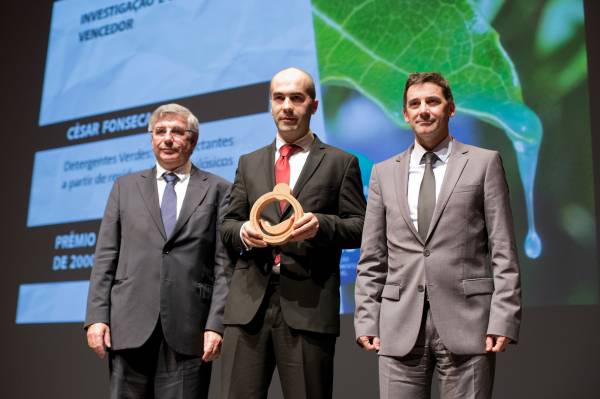Green Projects Awards recognize research on Green Detergents

Research on green detergents, developed in the thesis by Nuno Faria, PhD student in the MIT Portugal Program (MPP), Frederico Ferreira, Professor at the Instituto Superior Técnico and the MPP, and César Fonseca, researcher responsible for the FCT "TAKE-OFF" project at the National Laboratory of Energy and Geology (LNEG), was honored with the Jerónimo Martins/Green Project Awards in the Research and Development category. This award is the result of a Call by Quercus, the Portuguese Environment Agency, and GCI to reward sustainable development.
More than 90% of detergents sold today are chemically synthesized from non-renewable resources. In most cases, they are not biodegradable and therefore have a significant environmental impact, particularly in terms of water contamination. Even the bio-detergents available on the market are produced from vegetable oils, competing directly with food production. This new technology develops the manufacture of green detergents from renewable resources, using biomass as raw material, thereby reducing environmental impact and lowering production costs. It uses less intensive product purification processes and the resulting waste is biodegradable and non-toxic.
The process includes some of the operations used in the production of biofuels, specifically second-generation bioethanol (2G or lignocellulosic). The preparation of raw materials and enzymes is the same, but with a different yeast, which instead of producing ethanol produces a glycolipid with biodetergent properties. At present, manufacturing takes place in the laboratory and takes 10 days, involving the preparation of the raw material, bioconversion using yeast cultivated in a bioreactor, and recovery and purification of the product obtained for subsequent application.
Green detergents are a sustainable alternative that can be used at home and in businesses, as well as in other applications for the pharmaceutical and cosmetics industries, with a very low environmental impact. The research has already led to an international patent, and the team is hopeful that the product will soon be commercially viable. They have begun contacting national and international companies to develop the technology on an industrial scale. Other applications of this technology are also expected to be developed, with a view to creating a pipeline of environmentally friendly products.
This research is part of the objectives of the second phase of the MIT (Massachusetts Institute of Technology) – Portugal partnership, one of four partnerships with American universities funded by FCT. Renewed in November 2012 for another five years, the second phase of these partnerships places greater emphasis on joint research projects between universities/research centers and companies, aimed at solving specific problems and involving students and researchers. It is based on a shift in focus from postgraduate training and the creation of critical mass to a strengthening of innovation and entrepreneurship.
(Based on news from the MIT-Portugal Program)